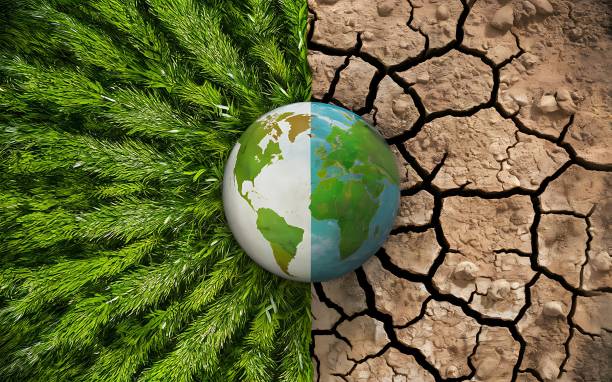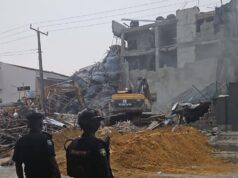From Our Housing Stand
Across Nigeria today, the signs of environmental distress are no longer distant warnings — they are right before our eyes. Flooded cities, polluted air, dying forests, and disappearing farmlands all tell a single painful truth: our environment is collapsing under the weight of human neglect and poor governance. The country’s rapid urbanization, industrial expansion, and population growth have outpaced environmental management, leaving us with a fragile ecosystem that can no longer sustain our pace of exploitation.
From Lagos to Kano, Port Harcourt to Maiduguri, the evidence is undeniable. Plastic waste clogs drainage systems, leading to yearly floods that destroy homes and livelihoods. Open defecation and indiscriminate dumping of refuse have become common sights even in city centers. The air in many industrial areas is thick with toxic emissions, while rivers once teeming with life are now channels of chemical waste. This is not just an environmental crisis; it is a national emergency affecting health, food security, and economic growth.
The Price of Neglect
Environmental neglect is not new in Nigeria. For decades, policies have been drafted, agencies established, and committees formed — yet implementation remains our greatest weakness. The Federal Ministry of Environment and several state agencies exist largely on paper, with inadequate funding and political support. Environmental Impact Assessments (EIAs), which should guide construction and industrial projects, are often treated as mere formalities rather than vital safeguards.
As a result, our forests continue to shrink. According to the Food and Agriculture Organization (FAO), Nigeria loses over 350,000 hectares of forest yearly, making it one of the countries with the highest deforestation rates in the world. Illegal logging, bush burning, and unregulated mining activities have stripped vast areas of vegetation, worsening soil erosion and desertification. In the North, advancing deserts are swallowing farmlands and displacing entire communities. In the South, oil spills and gas flaring continue to poison water sources and farmlands, leaving generations of Niger Delta residents in despair.
Climate Change: The Gathering Storm
Nigeria is already feeling the brunt of climate change. Irregular rainfall patterns, extreme heat, and flooding events have become more frequent and destructive. The 2022 nationwide floods, for instance, displaced over 1.4 million people and destroyed thousands of hectares of farmland. Yet, beyond sympathy and temporary relief, little has changed.
Climate change is no longer a future threat; it is a present reality reshaping our economy and our daily lives. Farmers can no longer predict planting seasons; fishermen watch as their catches dwindle; and ordinary Nigerians face rising costs of food and water. Despite these realities, climate action remains low on the list of national priorities, overshadowed by politics, insecurity, and economic struggles.
Urban Growth, Rural Decay
Nigeria’s cities are expanding at breakneck speed, but most of this growth is unplanned and environmentally destructive. Uncontrolled construction on floodplains, poor waste management, and the destruction of green belts are making cities hotter, dirtier, and less livable. The heatwaves of recent years are worsened by the near absence of urban greenery — trees that could provide shade, filter air, and absorb carbon are routinely cut down to make way for concrete.
Meanwhile, rural communities are being left behind, their lands degraded and their young people migrating to overcrowded cities in search of opportunity. This imbalance creates a dangerous cycle: cities swell without infrastructure, while rural areas collapse without support. Sustainable development demands balance — investment in rural renewal and smart urban planning.
The Role of Citizens and the Private Sector
Government inaction cannot excuse citizen carelessness. Nigerians must confront their everyday role in environmental degradation. From burning refuse in open spaces to pouring waste into gutters, our daily habits collectively destroy the ecosystem we depend on. Civic responsibility must return to the heart of public life.
Businesses, too, must rise to the challenge. The private sector has enormous potential to drive green innovation — through recycling, renewable energy, and responsible production. Corporate social responsibility (CSR) should move beyond token tree planting or cleanup campaigns to real, measurable sustainability goals. Banks, developers, and manufacturers must integrate environmental accountability into every aspect of their operations.
Building a Green Economy
A green economy is not only about protecting nature; it is also a path to prosperity. Renewable energy, recycling industries, eco-tourism, and sustainable agriculture can generate millions of jobs while preserving the environment. Nigeria’s abundant sunlight, vast arable land, and young population offer immense potential. What is missing is consistent political will and investment in green infrastructure.
Solar farms can replace diesel generators. Biogas can power rural communities. Reforestation projects can restore soil fertility while creating employment. What we need is a national roadmap — one that aligns climate goals with economic planning, so that protecting the environment becomes part of our development DNA.
Policy Reforms for a Sustainable Future
To move forward, Nigeria must take decisive steps:
- Enforce Environmental Laws: No nation can grow sustainably without accountability. Environmental offenders — whether individuals, companies, or government agencies — must face real penalties, not empty warnings.
- Invest in Waste Management: Modern waste recycling plants, proper landfill systems, and community sorting programs should replace the current culture of indiscriminate dumping.
- Promote Renewable Energy: Subsidies and incentives should be redirected toward solar, wind, and biomass energy projects, especially in off-grid rural communities.
- Empower Environmental Education: Schools and media must take the lead in changing attitudes. Every Nigerian child should learn the importance of recycling, conservation, and sustainable living.
- Restore Green Spaces: Every urban area should have mandatory green zones — parks, gardens, and tree-lined streets — to combat heat and pollution.
- Support Local Innovation: Environmental start-ups and youth-led initiatives deserve funding and visibility. The future of sustainability lies in local creativity.
Nigeria’s environmental crisis is not beyond repair. But we must act fast — and act together. The planet will not wait for our politics to settle or our economy to improve before responding to our neglect. Each flood, each drought, each heatwave is a warning.
The moral responsibility to protect the environment rests on all of us — government, industry, and individuals alike. A cleaner, greener Nigeria is not a dream; it is an achievable goal if we begin now, with sincerity and collective resolve.
As the late environmental activist Ken Saro-Wiwa once said, “The environment is man’s first right.” Without it, every other right — to health, food, or shelter — becomes meaningless. Nigeria must remember this truth before it is too late. The time to rebuild harmony with nature is now.




